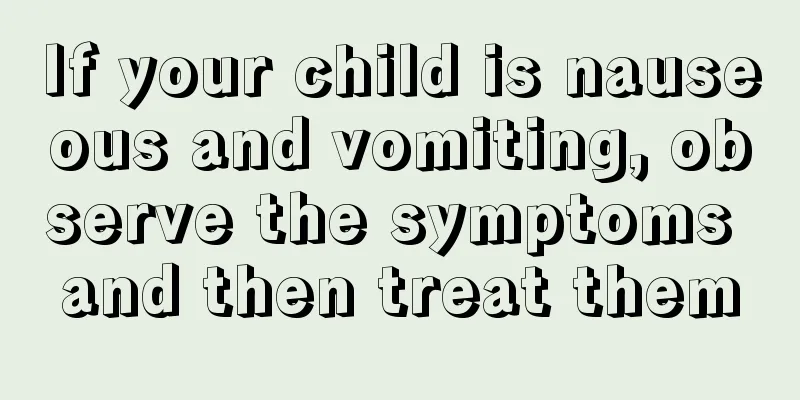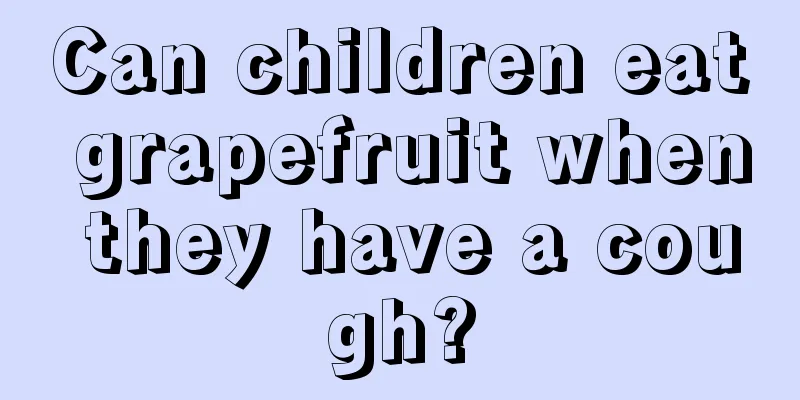If your child is nauseous and vomiting, observe the symptoms and then treat them

|
Sometimes children will experience symptoms of nausea and vomiting, which will cause parents to become anxious and even try all kinds of medical treatments in desperation. In fact, parents should judge the severity of their children's illness based on their children's different symptoms of nausea and vomiting, observe carefully and record in detail before going to the doctor, provide the doctor with the most detailed symptoms of the disease, assist the doctor in making the correct treatment plan, and restore the child's health as soon as possible. 1. Symptom observation ①Is the vomiting related to food or medicine? Is the vomiting periodic and is it projectile? ② Does the vomiting usually occur at a regular time? Is it accompanied by coughing? Is it related to eating too much high-fat food? Did the vomiting occur during or after eating? ③Is the nature of the vomit stomach contents, bile, or feces? ④ Is vomiting accompanied by abdominal pain, diarrhea, constipation, bloody stools? Does the child have fever, headache, mental and personality changes, etc.? 2. Treatment recommendations 1. If your child is a baby and vomits a small amount of milk after being fed formula. Then, this vomiting may be related to the formula, or the child may be lactose intolerant or allergic. It is recommended to change the formula milk. If vomiting worsens, seek medical attention immediately. 2. If your child is under 10 weeks old and vomits a large amount of milk powder or liquid and has symptoms of dehydration. This may be caused by pyloric stenosis at the child's gastric fundus. It is recommended to take the child to the doctor immediately. Pyloric stenosis is a congenital disease and requires further surgical treatment. 3. If your child has diarrhea, red stools, continues to vomit liquid, and cries all the time, especially when you press his knees against his chest. This could be a bowel obstruction and immediate medical attention is recommended. 4. If your child has diarrhea accompanied by nausea and vomiting. It may be due to viral enteritis. It is recommended that children drink more water and avoid fever. If diarrhea and vomiting worsen, seek medical attention immediately. 5. Children under 2 years old who vomit continuously for 6-12 hours; children over 2 years old who vomit continuously for more than 12-24 hours are very likely to become dehydrated. It is recommended to seek medical attention immediately, replenish electrolytes, and receive symptomatic treatment. |
<<: What are the dangers of tooth decay in children’s deciduous teeth?
>>: Common tips for treating baby constipation
Recommend
Symptoms of urinary tract infection in little boys, parents need to know clearly
Generally speaking, boys are less likely to suffe...
Symptoms of bloating in babies
Now more and more parents are paying more attenti...
Treatment for blistered tongue in children
In life, many parents pay attention to their chil...
How often should newborn diapers be changed?
Nowadays, many parents put diapers on their babie...
The reason why babies have white hair
You know, it is not an easy thing to know how to ...
Is it OK for children to take motion sickness medicine regularly?
Recently my niece always feels dizzy when riding ...
What should parents do when a three-year-old child has repeated fevers?
Do you parents know why three-year-old children h...
What is the cause of blood in the child's urine?
Only parents' careful care for their children...
The child's poop is white
Everyone knows that when children are young, beca...
Benefits of olive oil for children
Olive oil is an item that is often used in our da...
Baby cries before going to bed
There are many reasons why babies cry when they s...
Newborn baby's legs shaking like cramps
If a newborn baby has cramp-like shaking in his l...
What are the reasons why babies have difficulty falling asleep?
Baby sleeping is a problem that many mothers worr...
What to do if your baby sneezes and has a runny nose
There are many common physical problems for babie...
What should I do if my baby is shy and timid?
Many parents have the question of why other peopl...









